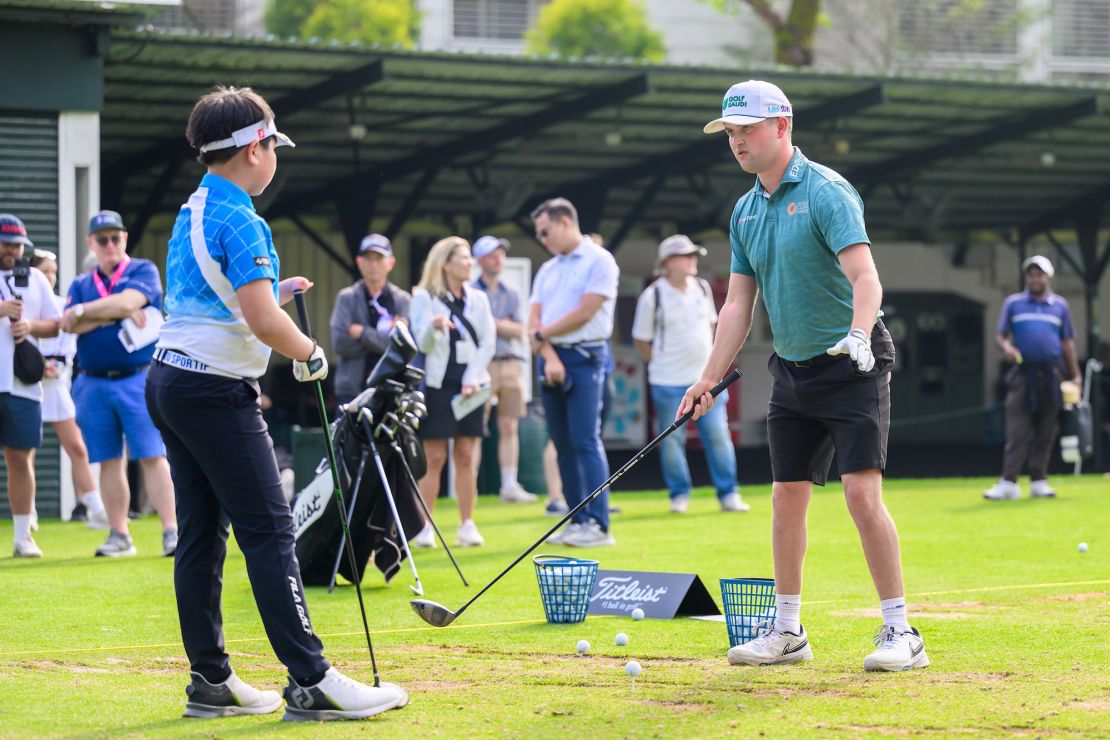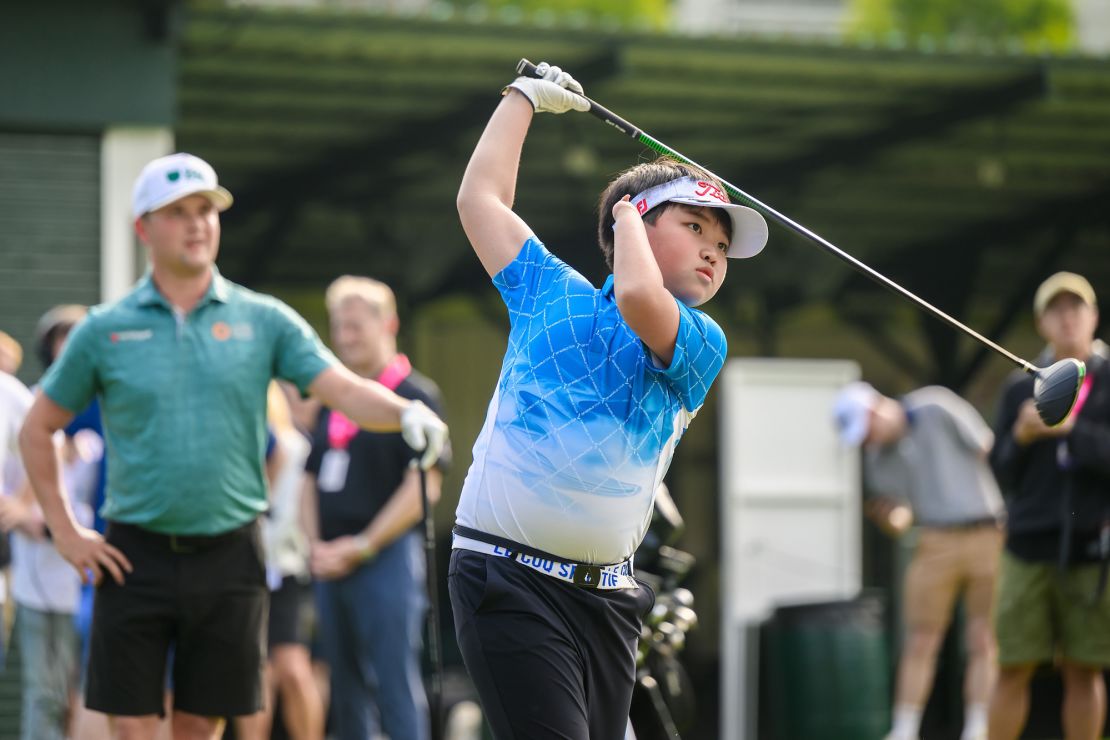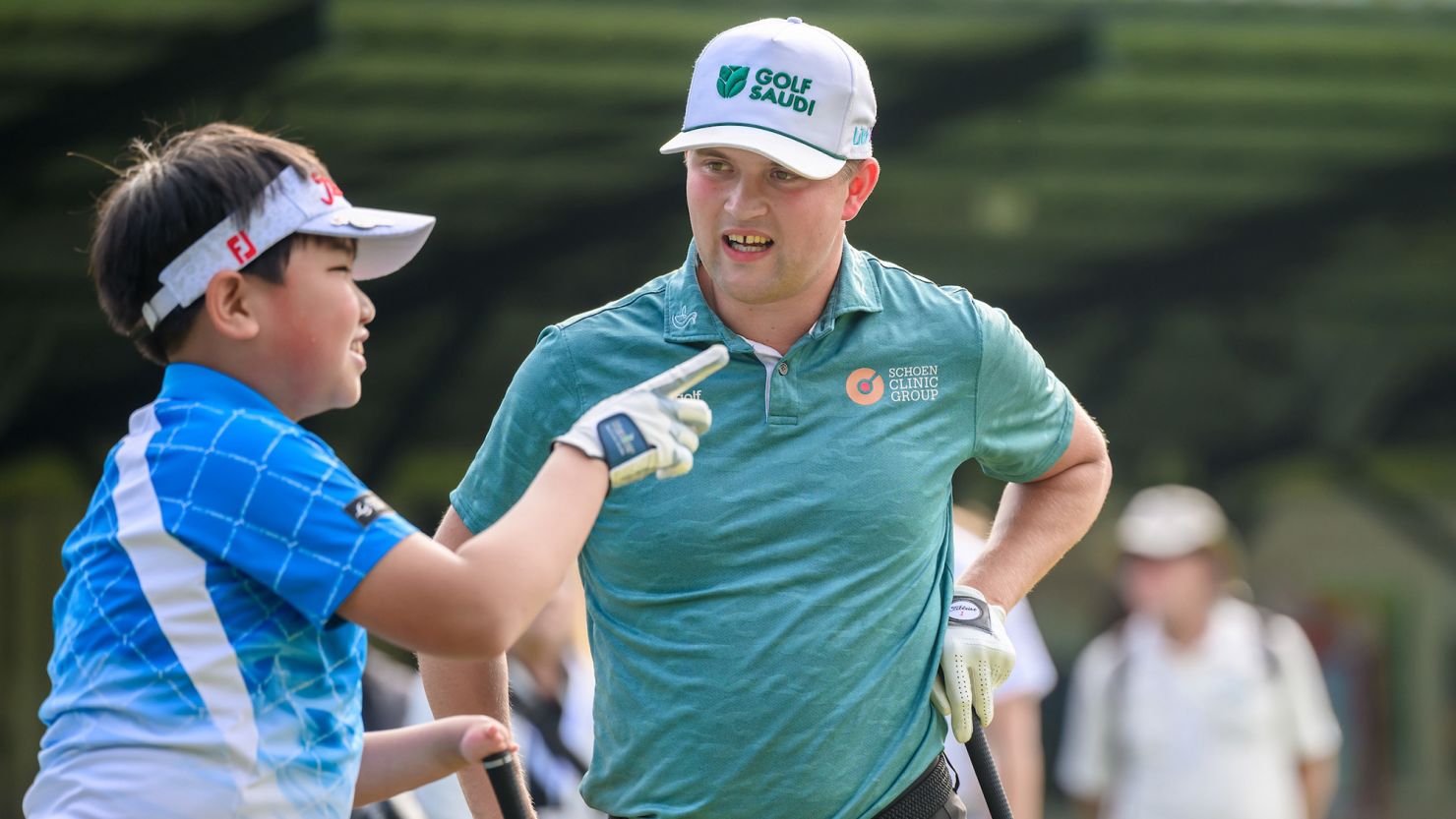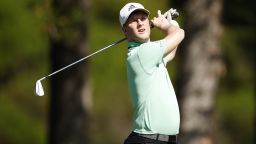“I’ll make sure there’s prize money for you,” world No. 1 disabled golfer Kipp Popert promised 12-year-old local talent Andreas Ma after a chipping class between rounds at the Hong Kong Open last month.
Popert’s inclusion marked the first time in the tournament’s history that a disabled golfer teed off with the pros. He is also the first golfer with cerebral palsy to compete on the Asian Tour’s International Series.
Bridging the gap between disabled and able-bodied golf has long been the dream for the 26-year-old Briton – but inspiring young talents some 6,000 miles away is a welcome by-product.
Ma, a junior champion born with a congenital absence of his left hand, could be seen grinning while soaking in some of Popert’s expert tips at the range.
“It was amazing meeting Andreas. He said he was nervous, but I thought he handled it really well,” said Popert, a two-time reigning US Adaptive Open champion coming off of a commanding season on tour.
“To know that disabled children going through tough times and operations might be able to dream of being the next world No. 1 disabled golfer, or be able to achieve something they want in their life – how cool is that?”

Sharing the links with the likes of former US Open winner Justin Rose and South Korean superstar Tom Kim would be monumental – even daunting – to many. For Popert, it’s just par for the course.
That he did not have a disabled golf role model to aspire to growing up, nor a proven pathway to turn pro, meant he had to create them himself – “like I’ve done my whole life.”
“Playing against these boys doesn’t faze me at all – that’s not disrespecting them, they are incredible athletes,” Popert said.
“But I know what I can achieve. I want to be (competing) in the last group of three holes.
“Once I do finally lift one of these big trophies in able-bodied golf – and achieve more in disabled sport – it’s my mission to let Andreas and others know that they’re going to have a career. That there’s a lot of trophies to aim for when they turn pro.
“The prize money is coming, I will make sure of it. Sometimes, you have to force people to realize that – that’s just how society works, sadly.”

‘Pressing on’
Popert was diagnosed with spastic diplegia as a child, a form of cerebral palsy affecting the lower extremities of the body. He required painstaking physiotherapy through his formative years and underwent 11 operations in his teens.
His parents, Richard and Lindsey, are doctors and were extremely supportive throughout his treatment and athletic pursuits.
“He was born 10 weeks prematurely – he just fitted on my hand,” Richard recalled.
“We didn’t realize there had been anything particularly wrong at the time, but he had a birth injury – a bleed, probably – at the age of about four weeks. It was only really when he started to walk that we noticed he was a bit slow to walk.
“But he would always pick himself up again and again, and he had fantastic hand-eye coordination.”

Popert was introduced to golf after his father bought him a pair of light clubs and showed him video tapes of legendary American golfer Bobby Jones.
He would drop off and pick up Popert at the local golf club before and after shifts, which meant the aspiring golfer would practice for up to 15 hours a day, obsessively trying to lower his handicap and sharpen his positive mindset.
“He just had that ability to keep going,” Richard said.
“Even when he had those surgeries, Botox injections and splinting, he never stopped. It was his belief. Nobody believes in Kipp more than himself.”
Popert added, “As my dad and grandad used to say, it’s ‘pressing on.’ Throughout the whole time, people told me it was probably a dumb choice. But the more people said it, the more I just thought, ‘You’ll see.’ And I’m not done yet.”
‘Seeing is believing’
Despite being the planet’s top disabled player and continuing to smash barriers into the able-bodied realm, Popert is still technically an amateur.
There is yet to be a financially sustainable route to play professionally – many events have no purse for disabled players, while the amateur circuit provides far more playing opportunities.
“I never had a Tiger Woods or Tom Kim (situation) where you got to 14, 15 (years old) and it’s like, ‘Here’s the pathway, here’s the funding. Smash this, smash that, and you’ll be there,’” Popert explained.
“I just did it all myself. All I needed was a chance. It’s how I’m wired.”
Brendan Lawlor of Ireland, the former world No. 1 and current number two, blazed the trail as the first disabled golfer to turn pro in 2019 and the first golfer with a disability to compete on the European Tour. In what is a promising start, Lawlor helped to set up the first prize money invitational event for disabled golfers two years ago.
Popert believes further incentivizing disabled golfers to go full-time – “like we do in the men’s and women’s able-bodied game” – would naturally filter down to national team, junior and grassroots levels, and create more visible role models to aspire towards.
“The concept of ‘seeing is believing’ is an interesting one,” he said. “That’s true, but if you can’t see something with your eyes, you can see it in your mind.
“I could never look at any of (the able-bodied golfers) because they were so much more advanced than me at 16 years old. What I learned is anyone that overachieves in sport – Kobe Bryant, Tiger Wood, Michael Jordan – all comment on how they weren’t the best when they first started. That gave me a lot of confidence, and it hurts when I see so many kids get disheartened from a couple of failures.”

‘I really want to be like Kipp’
While Popert has already become a success story for young golfers around the world, he draws most of his inspiration from his late cousin, Archie Bruce, a promising rugby league player who died aged 20 in 2019.
“Pressing on has got me to this point – through the millions of tough days – and is what will get me further. It’s got me through the hardest points in my life when my cousin passed away,” an emotional Popert said, gesturing to the back of his cap, which has Bruce’s name and jersey number stitched on.
“A lot of people would tell him he couldn’t achieve things, so we used to text motivating messages to each other. When you have support from your family, it doesn’t really matter what people say or think. It’s a privilege to represent him and my family.
“It wasn’t what I set out to do, but if based off a selfish act of getting really good at golf I can provide opportunities for future players and change a lot of lives – what an opportunity.”
Ma, the young golfer Hong Kong who spent valuable one-on-one time with Popert, said, “When I’m older, I really want to be like Kipp. I want to be world No. 1.”






